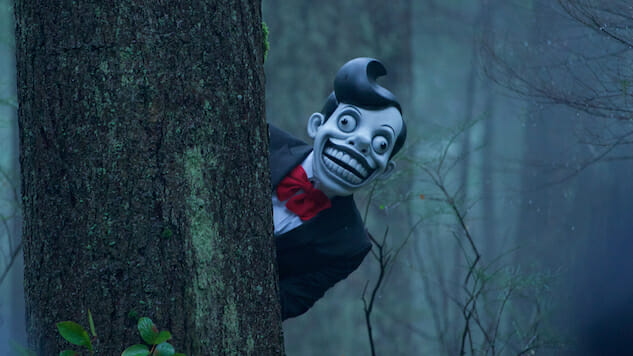Within the course of the cold open alone, the mystery of “Familiar” has an obvious solution. So obvious, in fact, that the rest of the episode’s 40 or so minutes do little more than confirm hunches, solidify motivations and generally insult all but the most uninvested viewers with red herrings and unflinching violence, as if eleven seasons of The X-Files haven’t reached sometimes brilliant heights based on a mastery of tone, of suspense, of upending television procedural tropes without resorting to treating the audience like they’re stupid. “Familiar” lives up to its title so unironically, the episode is practically over before it starts.
So it goes: Mulder (David Duchovny) and Scully (Gillian Anderson) investigate the death of Andrew Eggers (Sebastian Billingsley-Rodriguez), a young boy in a small, tight-knit community where, according to Mulder, a Salem-style witch hunt occurred in the 17th century. Mulder explains this history to Scully by pointing to the exact spot where the woman accused of witchcraft died, because apparently Mulder’s pored over countless maps and cross-checked historical records to deduce the precise, non-descript location where this piece of historical ephemera happened more than 400 years ago.
Like usual, Mulder and Scully face opposition from the town’s head of police, Chief Strong (Alex Carter), who insists that based on the available evidence, the kid was mauled to death by some sort of large animal (ostensibly a wolf). He’s extra protective because the kid was the son of Officer Rick Eggers (Jason Gray-Stanford), whose wife, Diana (Sharon Taylor), we observe in the aforementioned cold open arguing with someone on the phone about what’s clearly an affair. Before Mulder and Scully even see the body, it all clicks into place: Diana and Chief Strong are having an affair, which is so not-secret that Strong’s wife, Anna (Erin Chambers), knows full well what’s been going on, inspiring her to punish Diana by killing Andrew via black magic, a prediction we can extrapolate based on A) the introduction of witchcraft and the name of the episode (“familiar” being the supernatural, non-human envoy of a witch or warlock); and B) the fact that the only witnesses to the Eggers’ kid’s disappearance in the cold open were Anna and her daughter, Emily (Emma Oliver).
Scully manages to convince Chief Strong that Andrew may have been murdered, reciting the many profiler rules-of-thumb when it comes to such tragedies, like: It was probably someone Andrew knew, someone who found the murder sexual, etc. This information of course makes its way back to Andrew’s dad, who searches the police database, finds the town’s one unregistered sex offender, Melvin Peters (Ken Godmere), and then goes vigilante, chaos in his eyes and bereft beyond all reason, to find Melvin and seek revenge. While Scully chases after the crazed Eggers with Chief Strong and Officer Winters (Roger Cross), Mulder attempts to interview young Emily, discovering a shelf in the Strong household conspicuously lined with a grimoire and books on witchcraft. Anna dismisses Mulder’s inquiry by explaining that her husband’s a history buff when it comes to the town’s past, but c’mon, lady, and c’mon The X-Files, you’re barely even trying here.
Workmanlike writer Benjamin Van Allen and director Holly Dale vaguely try to throw us off the scent, but nothing sticks, the two instead intent on exploring the idea of mass hysteria—or something—which they use to explain both the town’s gang beating of an innocent Melvin Peters, and Eggers’ subsequent murder, in cold blood, of Peters on the spot, which pretty much goes unpunished. The moment in which Eggers pulls out his gun and shoots Peters in the head in front of a congregation of civilians might be some sort of brutal, surreal commentary on the rage-filled state of our nation were it not so ludicrously shoveled under the rug of plot contrivance. Granted, they’re federal agents and so conditioned against emotional reactions in situations like this, but Mulder and Scully’s dearth of a response to such a heinous act only confirms that the reality of the themes The X-Files now explores, especially in this frankly bad episode, come with a patina of serialized amnesia and the ever-present knowledge that this is just some hack shock-for-the-sake-of-it television.
After Hell literally breaks loose and everyone you know will die does, upon Mulder and Scully’s last words as they gladly exit town, one realizes that besides bringing up the whole “witchcraft!” theory in the first place, the two agents functionally did nothing besides get an innocent man gunned down in the street. Had Scully’s institutionalized knowledge of child murder not reached Eggers’ fevered, grief-leaden mind, he wouldn’t have taken out the tragedy on Peters, and still, everyone who died during this episode would have died anyway due to the circumstances of the town’s mystery. Everything Mulder surmised about witchcraft simply served the audience’s comprehension; everything that came to pass bore no practical origin in Mulder’s postulations.
Conceptually, there is a lot to think about in Mulder and Scully spending most of this eleventh season floating from one weird happening to another, witnessing the perplexities of the Trump era but helpless to do much to stop all the suffering they encounter. Actively, this is short-sighted, spotty-ass writing, beholden to high-concept ideas without the intelligence or imagination to give them weight, to anchor all the weirdness in anything but grim, typically grotesque bloodshed. You might as well consider this the low point of a season on its last legs, but we’ve still got one more Chris Carter-helmed episode to come.
Dom Sinacola is Associate Movies Editor at Paste
and a Portland-based writer. He’s been to at least
one X-Files
convention. You can follow him on Twitter.